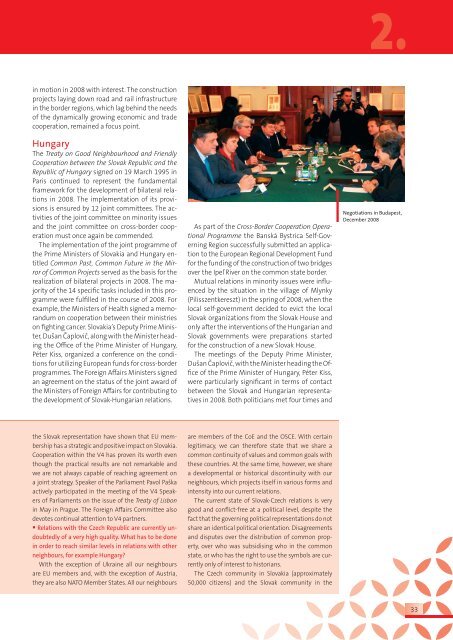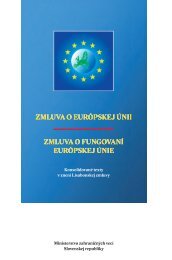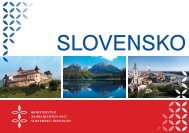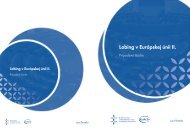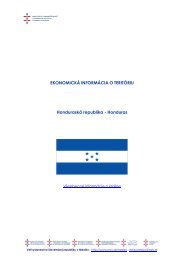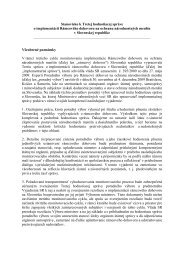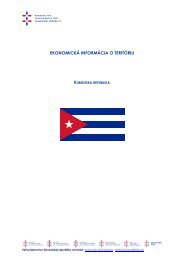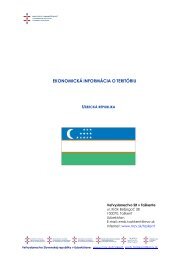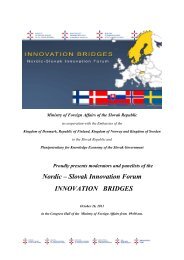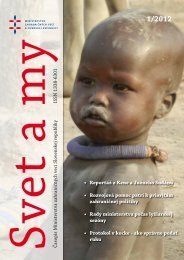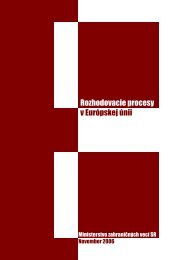Annual Report Ministry of Foreign Affairs of the Slovak Republic 2008
Annual Report Ministry of Foreign Affairs of the Slovak Republic 2008
Annual Report Ministry of Foreign Affairs of the Slovak Republic 2008
You also want an ePaper? Increase the reach of your titles
YUMPU automatically turns print PDFs into web optimized ePapers that Google loves.
2.<br />
in motion in <strong>2008</strong> with interest. The construction<br />
projects laying down road and rail infrastructure<br />
in <strong>the</strong> border regions, which lag behind <strong>the</strong> needs<br />
<strong>of</strong> <strong>the</strong> dynamically growing economic and trade<br />
cooperation, remained a focus point.<br />
Hungary<br />
The Treaty on Good Neighbourhood and Friendly<br />
Cooperation between <strong>the</strong> <strong>Slovak</strong> <strong>Republic</strong> and <strong>the</strong><br />
<strong>Republic</strong> <strong>of</strong> Hungary signed on 19 March 1995 in<br />
Paris continued to represent <strong>the</strong> fundamental<br />
framework for <strong>the</strong> development <strong>of</strong> bilateral relations<br />
in <strong>2008</strong>. The implementation <strong>of</strong> its provisions<br />
is ensured by 12 joint committees. The activities<br />
<strong>of</strong> <strong>the</strong> joint committee on minority issues<br />
and <strong>the</strong> joint committee on cross-border cooperation<br />
must once again be commended.<br />
The implementation <strong>of</strong> <strong>the</strong> joint programme <strong>of</strong><br />
<strong>the</strong> Prime Ministers <strong>of</strong> <strong>Slovak</strong>ia and Hungary entitled<br />
Common Past, Common Future in <strong>the</strong> Mirror<br />
<strong>of</strong> Common Projects served as <strong>the</strong> basis for <strong>the</strong><br />
realization <strong>of</strong> bilateral projects in <strong>2008</strong>. The majority<br />
<strong>of</strong> <strong>the</strong> 14 specific tasks included in this programme<br />
were fulfilled in <strong>the</strong> course <strong>of</strong> <strong>2008</strong>. For<br />
example, <strong>the</strong> Ministers <strong>of</strong> Health signed a memorandum<br />
on cooperation between <strong>the</strong>ir ministries<br />
on fighting cancer. <strong>Slovak</strong>ia’s Deputy Prime Minister,<br />
Dušan Čaplovič, along with <strong>the</strong> Minister heading<br />
<strong>the</strong> Office <strong>of</strong> <strong>the</strong> Prime Minister <strong>of</strong> Hungary,<br />
Péter Kiss, organized a conference on <strong>the</strong> conditions<br />
for utilizing European funds for cross-border<br />
programmes. The <strong>Foreign</strong> <strong>Affairs</strong> Ministers signed<br />
an agreement on <strong>the</strong> status <strong>of</strong> <strong>the</strong> joint award <strong>of</strong><br />
<strong>the</strong> Ministers <strong>of</strong> <strong>Foreign</strong> <strong>Affairs</strong> for contributing to<br />
<strong>the</strong> development <strong>of</strong> <strong>Slovak</strong>-Hungarian relations.<br />
As part <strong>of</strong> <strong>the</strong> Cross-Border Cooperation Operational<br />
Programme <strong>the</strong> Banská Bystrica Self-Governing<br />
Region successfully submitted an application<br />
to <strong>the</strong> European Regional Development Fund<br />
for <strong>the</strong> funding <strong>of</strong> <strong>the</strong> construction <strong>of</strong> two bridges<br />
over <strong>the</strong> Ipeľ River on <strong>the</strong> common state border.<br />
Mutual relations in minority issues were influenced<br />
by <strong>the</strong> situation in <strong>the</strong> village <strong>of</strong> Mlynky<br />
(Pilisszentkereszt) in <strong>the</strong> spring <strong>of</strong> <strong>2008</strong>, when <strong>the</strong><br />
local self-government decided to evict <strong>the</strong> local<br />
<strong>Slovak</strong> organizations from <strong>the</strong> <strong>Slovak</strong> House and<br />
only after <strong>the</strong> interventions <strong>of</strong> <strong>the</strong> Hungarian and<br />
<strong>Slovak</strong> governments were preparations started<br />
for <strong>the</strong> construction <strong>of</strong> a new <strong>Slovak</strong> House.<br />
The meetings <strong>of</strong> <strong>the</strong> Deputy Prime Minister,<br />
Dušan Čaplovič, with <strong>the</strong> Minister heading <strong>the</strong> Office<br />
<strong>of</strong> <strong>the</strong> Prime Minister <strong>of</strong> Hungary, Péter Kiss,<br />
were particularly significant in terms <strong>of</strong> contact<br />
between <strong>the</strong> <strong>Slovak</strong> and Hungarian representatives<br />
in <strong>2008</strong>. Both politicians met four times and<br />
Negotiations in Budapest,<br />
December <strong>2008</strong><br />
<strong>the</strong> <strong>Slovak</strong> representation have shown that EU membership<br />
has a strategic and positive impact on <strong>Slovak</strong>ia.<br />
Cooperation within <strong>the</strong> V4 has proven its worth even<br />
though <strong>the</strong> practical results are not remarkable and<br />
we are not always capable <strong>of</strong> reaching agreement on<br />
a joint strategy. Speaker <strong>of</strong> <strong>the</strong> Parliament Pavol Paška<br />
actively participated in <strong>the</strong> meeting <strong>of</strong> <strong>the</strong> V4 Speakers<br />
<strong>of</strong> Parliaments on <strong>the</strong> issue <strong>of</strong> <strong>the</strong> Treaty <strong>of</strong> Lisbon<br />
in May in Prague. The <strong>Foreign</strong> <strong>Affairs</strong> Committee also<br />
devotes continual attention to V4 partners.<br />
Relations with <strong>the</strong> Czech <strong>Republic</strong> are currently undoubtedly<br />
<strong>of</strong> a very high quality. What has to be done<br />
in order to reach similar levels in relations with o<strong>the</strong>r<br />
neighbours, for example Hungary?<br />
With <strong>the</strong> exception <strong>of</strong> Ukraine all our neighbours<br />
are EU members and, with <strong>the</strong> exception <strong>of</strong> Austria,<br />
<strong>the</strong>y are also NATO Member States. All our neighbours<br />
are members <strong>of</strong> <strong>the</strong> CoE and <strong>the</strong> OSCE. With certain<br />
legitimacy, we can <strong>the</strong>refore state that we share a<br />
common continuity <strong>of</strong> values and common goals with<br />
<strong>the</strong>se countries. At <strong>the</strong> same time, however, we share<br />
a developmental or historical discontinuity with our<br />
neighbours, which projects itself in various forms and<br />
intensity into our current relations.<br />
The current state <strong>of</strong> <strong>Slovak</strong>-Czech relations is very<br />
good and conflict-free at a political level, despite <strong>the</strong><br />
fact that <strong>the</strong> governing political representations do not<br />
share an identical political orientation. Dis agreements<br />
and disputes over <strong>the</strong> distribution <strong>of</strong> common property,<br />
over who was subsidising who in <strong>the</strong> common<br />
state, or who has <strong>the</strong> right to use <strong>the</strong> symbols are currently<br />
only <strong>of</strong> interest to historians.<br />
The Czech community in <strong>Slovak</strong>ia (approximately<br />
50,000 citizens) and <strong>the</strong> <strong>Slovak</strong> community in <strong>the</strong><br />
33


